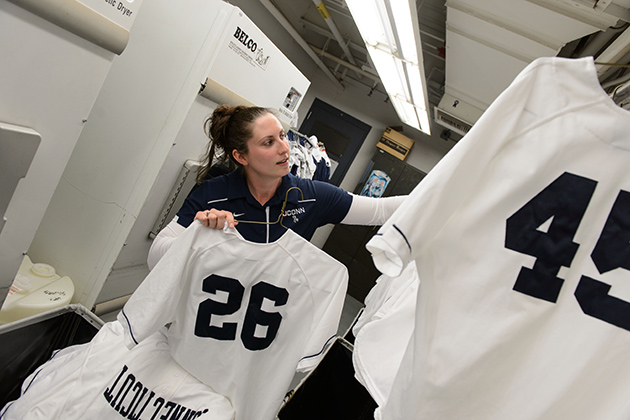
Megan Hastillo ’05 (CLAS) laughs about it now, but at the time it was anything but funny. It was a problem that had to be resolved.
The Huskies’ baseball team was playing a weekend series at home and one of the responsibilities of the Department of Equipment Services is to provide laundry services for visiting teams, as well as for the Huskies. Hastillo, an assistant director of equipment services, had checked all the pants pockets of the visitors’ uniforms to remove anything left by the student-athletes and had started the washing machine.
“It was 10 o’clock on a Saturday night and I thought I had checked all the pockets, but I somehow missed a wad of gum,” Hastillo says. “I couldn’t get the door to the washer open because it was stuck. I finally managed to get it open. The uniforms had residue from the gum on them. I had to re-treat them and throw them into another washer. It was the worst night I ever had here.”
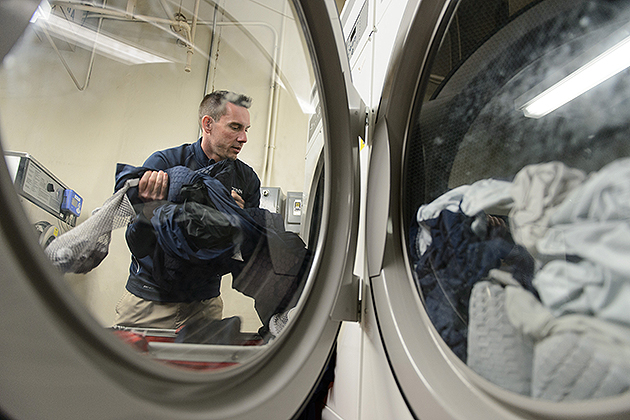
Keeping the nearly 700 student-athletes and dozens of coaches and assistant coaches looking their best with crisp, clean uniforms while representing the University is just part of the responsibility of Hastillo and the other members of the Department of Equipment Services. The staff of seven also orders and helps maintain all types of athletic equipment, including footwear from a variety of vendors; provides student-athletes and coaches with practice and game uniforms; and, in the case of football and ice hockey, travels with the team.
“Your ability to multitask is absolutely essential,” says Dan Glinski, who has served as director of Equipment Services for the past six-and-a-half years. “Our job is to put the student-athletes and coaches in the best position from an equipment and apparel standpoint so they don’t have to worry about it.”
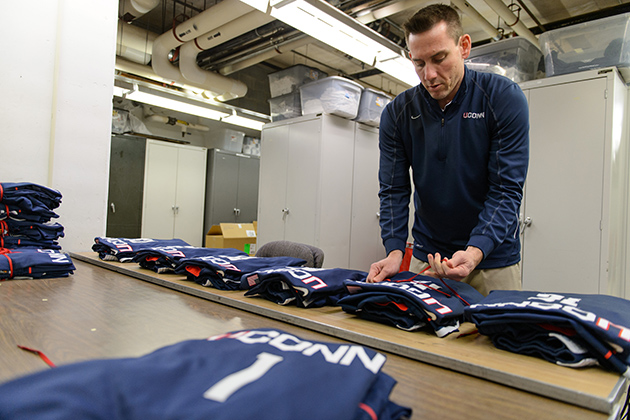
The staff also has to adjust to changes in team rosters, handle specific equipment requests from coaches, and respond to special situations such as the tragic shooting in Newtown, Conn., which took place on a Friday morning.
“As soon as I heard about the shooting, given the significance of the tragedy and its location, I immediately called a local vendor to see about doing a patch in honor of Newtown to be worn by the teams, along with a ribbon to be worn by coaches and staff for the basketball games on Monday and Tuesday,” Glinski says.
He took the jerseys to the vendor on Friday afternoon and picked up the jerseys and ribbons on Sunday for the games Monday and Tuesday night.
“Regardless of the season or sport, when serious events like this or special circumstances occur, it’s our job to make it happen,” Glinski says.
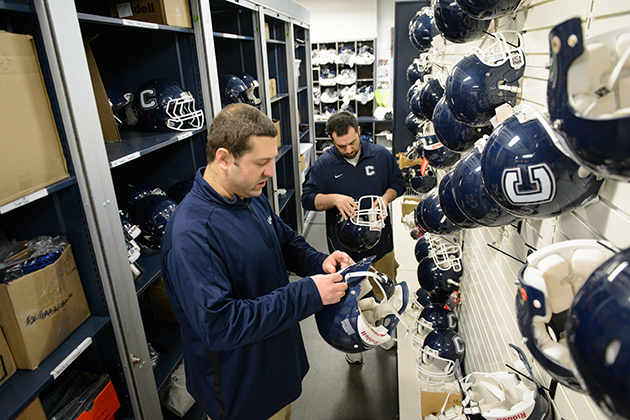
While football and ice hockey have their own equipment services operations, owing to their specialized equipment and facilities, most teams are serviced out of either Gampel Pavilion or the Greer Field House, where their locker rooms and training facilities are located.
In Gampel, Glinski handles men’s and women’s basketball, swimming and diving, men’s and women’s tennis, and golf. Hastillo and Mackenzie Rivers work the Field House, with Hastillo responsible for men’s and women’s soccer, baseball, and lacrosse. Rivers supports men’s and women’s track and field, softball, volleyball, field hockey, and rowing. They also are the central point for all Department of Athletics equipment deliveries, from uniforms and shoes, to nutrition and food products and medical training materials. Chris Iacampo ’02 (BGS) handles ice hockey at the Freitas Ice Forum and Chris Stasaitis ’01 (ED), ’03 MA oversees football operations at the Burton Family Football Complex.
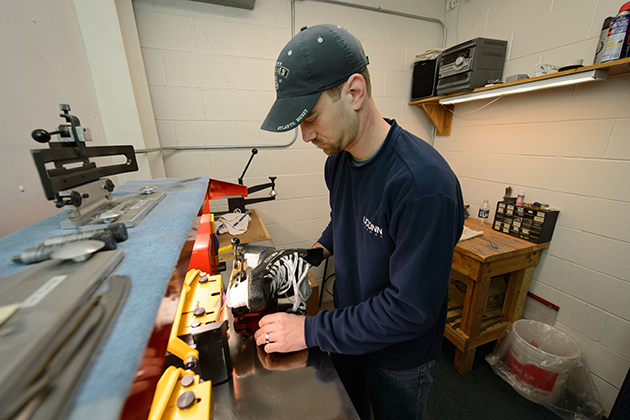
“It used to be that once school was out, everyone went home,” Glinski says. “Now, student-athletes are training year-round. A lot of our rooms are open seven days a week. There’s always a need for something. A lot of our events happen on the weekend, and we have multiple events happening during the year. On a normal day, we’re here from 8 a.m. to 4 p.m., but if there’s a late practice, we’re here. We don’t want to get a call from a coach or a team manager that we’re not available.”
Many sports such as golf, tennis, or swimming and diving, have relatively simple needs. Practice and game uniforms are issued, equipment may not need much servicing, and replacement footwear may be needed only periodically. Keeping uniforms clean may not be difficult.
However, sports like football, soccer, baseball, and softball often present regular challenges for keeping uniforms clean and equipment operational. Rivers and Hastillo agree that baseball and softball present some of the most challenging issues.
“Red clay, pine tar, and gum are the worst,” says Hastillo. “If they play on a turf field, there is black pebble resin. If it’s cold out, they’ve got Hot Hands to keep warm. If that’s not caught before it goes into the wash, it’s a mess.”
Rivers and Hastillo also have responsibility for taking deliveries, as a stream of trucks arrive with boxes of shoes, clothing, food, and gear that are stacked neatly around the perimeter of the equipment locker or placed on rolling storage units that maximize storage while minimizing space. The two work in tandem, assisting each other as needed and sharing their time using laundry facilities for the 10 teams they service.
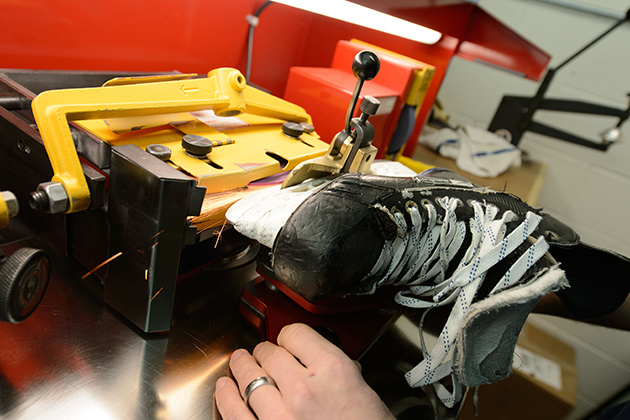
At Freitas Ice Forum, Iacampo says sharpening skates occupies at least an hour of each day, in addition to cleaning uniforms, repairing equipment, and adjusting sticks between games that usually occur over a weekend.
“Skates are probably the biggest difference between us and any other sports,” he says. “The time it takes to sharpen each day, fix rivets. The general things that can go wrong and need to be fixed by Monday or between the second and third period on a Saturday evening.”
Arguably the most wide-ranging set of team responsibilities lies in the football complex, where Stasaitis and his staff not only custom-fit as many as100 football players for protective gear, along with providing practice and game uniforms, but they also assist in setting up for practice sessions.
“We’re setting up position drills, yard markers, coning off end zones, spotting the balls, down markers, and chains, and we run the clock,” Stasaitis says. “There are two fields, one for offense and one for defense. Some of my student managers serve as an official during game speed drills, spotting the ball and blowing the whistle.”
Stasaitis says his staff follows a schedule of practice drills and activities provided by the coaching staff that requires intimate knowledge of the game and the specifics of each drill.
“We’re simulating the game for each segment of practice,” he says. “I have to understand what their practice script means and my managers have to know what a hash mark means, when we’re kicking field goals, the down and distances, and what’s going on next. And we’re fixing helmets, or a whistle when a coach breaks it.”
When traveling to away games, a truck is packed with most of the team’s equipment and support material and is driven to the road site. Stasaitis uses a detailed checklist to ensure that all players and coaches will have what they need upon arrival. But the football equipment staff also has a different situation, in that every game is a road game because the Huskies play their games at Rentschler Field in East Hartford. All uniforms for players and coaches must travel to the stadium, as well as the ancillary equipment for video services, training, and medical staff.
Starting in 2014, the men’s ice hockey team will have a similar situation, when the Huskies join Hockey East and all home games will be played at the XL Center in Hartford. Currently both basketball teams split home games between the XL Center and Gampel, but have less equipment that must travel to Hartford.
The student-athletes and coaches are among the biggest fans of the equipment staff.
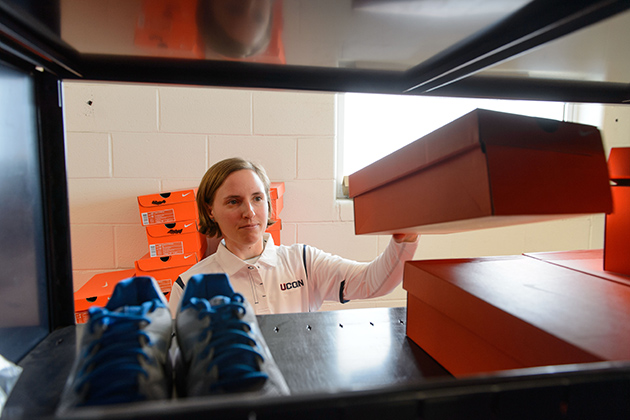
“People watch us on TV and I don’t think they realize how many people are behind our team and do so much work for us,” says assistant women’s basketball coach Shea Ralph ’01 (CLAS), who coordinates the team’s needs with Glinski. “They’re here way before the game and way after the game. The great thing about our equipment staff is that they take a lot of pride in what they do. They love our players and our players appreciate them.”
“I don’t know what we’d do without Mackenzie [Rivers],” says head softball coach Karen Mullins 79 (ED), ’80 MA. “She is always scrambling around to help us. If we need to order something, a kid forgets her uniform, or something needs to be replaced, it’s just, ‘Wow!’”
Adds head men’s soccer coach Ray Reid: “We work with both Megan [Hastillo] and Dan [Glinski]. They’re very serious about what we do, and when we travel they go above and beyond the call of duty. They take great pride in how we look on the field.”
The Husky student-athletes recognize the behind-the-scenes support they receive from the Department of Equipment Services, with an eye toward practicality.
“I break about two or three bats a season, and just today I had to replace my shoes. They’re my lifesavers,” says softball outfielder Marissa Guches ’13 (CLAS). “And it’s not a bad thing not to have to do your own laundry after practice.”



